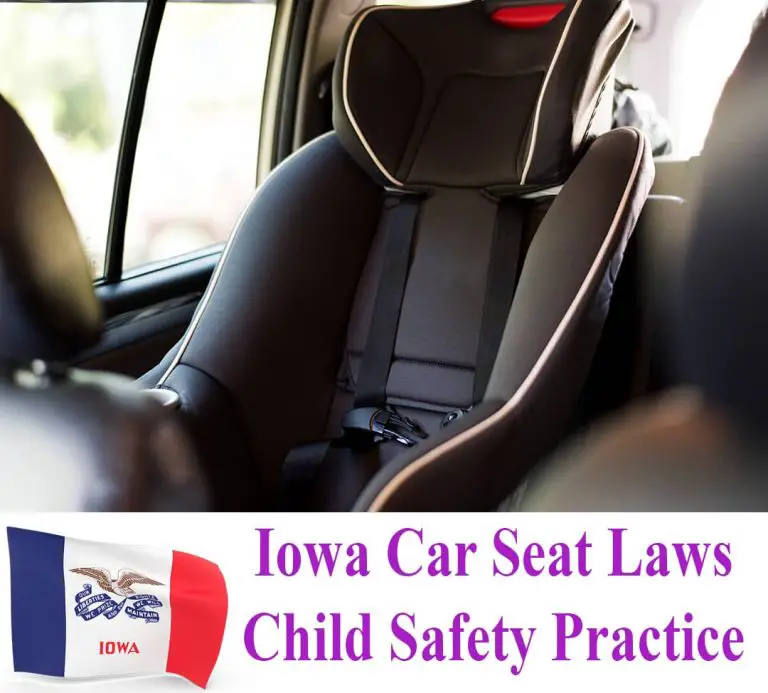Iowa Car Seat Laws - Updated & Simplified

Table of Contents
Iowa Car Seat Laws
The State of Iowa Car Seat Laws (IA Statutes 321-445 and 321-446)
IA Statutes 321-446 – Child restraint devices
What do the child passenger restraint system laws in Iowa say?
- Infants less than 12 months and weighing less than 20 lbs. shall be secured in a rear-facing child restraint system according to the manufacturer’s instructions.
- Toddlers and preschoolers under 6 years shall be secured in an appropriate child restraint system according to a manufacturer’s instruction.
- School-aged children and adolescents aged 6-18 years shall be secured in an appropriate child restraint system according to a manufacturer’s instruction or by a safety belt or safety harness.

More on the Law
- Exemptions:
- A child certified by a licensed physician to have a medical, physical or medical condition that impedes securing such child in a child restraint system, safety belt or safety harness.
- When all the back seat positions are occupied by other children secured in a child restraint or safety belt.
- Violation and Penalty: A person who violates the child restraint and seat belt laws is guilty of a simple misdemeanor and is punishable as follows:
- Violation of the use of a child restraint – $135
- Violation of the use of a safety belt – $70. – source (subsection 14, paragraph c.)
Rear-Facing Laws
Iowa car seat laws require that infants under 1 year and weighing less than 20 lbs. ride in a rear-facing car seat and according to the manufacturer’s instructions.
This aligns with the American Academy of Pediatrics recommendation that children under 2 years ride in a rear-facing car seat. However, the AAP further recommends that they ride at least 2 years rear-facing and to an upper limit of 4 years.
These days, most car seats, especially convertibles and all-in-ones, accommodate a good limit to allow your newborn to ride rear-facing as long as possible.
On the other hand, the child restraint law mentions “according to the manufacturer’s instruction,” therefore, your child can ride beyond the 1 year required age. However, not riding rear-facing under 1 year is against the law.
Forward-Facing Laws
According to car seat manufacturers’ recommendation, a child is to ride forward-facing when they outgrow the weight and height limit for the rear-facing car seat.
This will be in accordance with the Iowa car seat laws as it gives the go-ahead for a child under 6 years to be secured in an appropriate child restraint system.
The forward-facing car seat is recommended for children 2 or 4 years old to 8 years old.
A convertible car seat is recommended to save you some money in the long run. This type of car seat can be used as rear-facing and later converted to forward-facing. This is a good option when considering a car seat to buy during pregnancy. This article will help you in choosing a convertible car seat.
Booster Seat Laws
A belt-positioning booster seat is recommended when a child has outgrown the forward-facing weight and height limits, according to the manufacturer’s instructions.
A child is to then ride in such booster seat until they reach the height and body size that can fit properly in a safety seat belt or safety harness.
Note that a booster seat must be used with the lap and shoulder belt combination. The lap belt must not be used alone.
Seat Belt Laws
Iowa requires that a child between 6-and 18 years be secured in a restraint system or by a fastened safety belt or safety harness.
Car seat manufacturers recommend that your child be big enough before transitioning to a seat belt.
Usually, a child will be big enough to fit in properly in a seat belt between 8-and 12 years.
Here’s a short guide on a checklist to be sure your child will fit properly:
- A child must be able to sit all the way in the vehicle seat with their back flat against the seat with their knees bent at the edge of the seat.
- The shoulder belt part must be snug across the center of the child’s chest and the lap belt part across their lap at the hips.
Other Safety Seat Laws You Need to Know About in Iowa
Seat Laws for Other Passengers in a Car
The driver and front-seat occupants in a vehicle must fasten a safety belt.
Front Seat Law – Can A Child Sit in The Front Seat?
Iowa laws do not mention about the front seat position.
However, children are not to ride in the front seat till they are 13 years according to national best safe practices by the National Highway Traffic Safety Administration.
Notwithstanding, a rear-facing car seat must never be installed in the front passenger seat with an activated airbag.
On the other hand, the safest location to install a restraint system in a vehicle is in the middle back seat, away from the side windows.
Ubers, Taxis, or Cabs Law
The State of Iowa does not exempt taxis from the car seat laws.
There are punishments when the safety seat laws are violated in a taxi, and such citation is served to the parent, legal guardian or other responsible adult accompanying the child in the taxi instead of the taxicab driver or the transport network company. However, when the child passenger is above 14 years, the citation shall be served directly to such child.
The applicable fines are as follows:
- Violation of the use of a child restraint – $135
- Violation of the use of a safety belt – $70
Therefore, you should ensure to use a child seat when in a taxi and also educate your child about the seat belt law in Iowa.
This resource on installing an infant seat without a base will come handy when taking an infant seat in a taxi.
Is it Illegal to Smoke Around Children in a Car in Iowa?
Iowa does not yet have a law that bans smoking in a car around a minor.
However, smoking is not allowed in childcare homes and facilities, including vehicles owned, leased or provided by the childcare facility. This is according to the Iowa Smokefree Air Act.
Irrespective, as a parent, you should ensure not to smoke when around a child, be it in the car or at home. Secondhand tobacco smoke is dangerous for a child’s health and exposes them to several health problems, including severe asthma attacks, pneumonia, ear infections, respiratory infections, bronchitis, and sudden infant death syndrome (SIDS).
Helpful Resource in Iowa
Here is a go-to resource for more help on car seat inspection
- NHTSA Car Seat Inspection Stations directory – here
- Car Seat Inspection Program – The Johnston Police Department, City of Johnson – here.
- FREE Child Safety Seat Inspections and Installations – City of Iowa City Fire Department
- City of Waukee – Car Seat Safety Inspections
- City of Ames – Child Safety Seat Installation
- North Liberty Fire Department – Child Safety Seat Checks
- City of Newton Police Department – Child Safety Seat Inspections
- City of Urbandale Police Department – Car Seat Inspections
- City of Dubuque Police Department – Child Safety Seat Inspections – Child Passenger Safety Project

